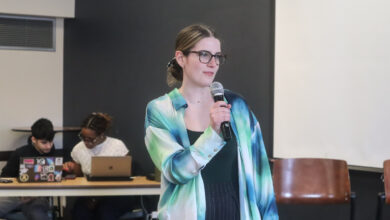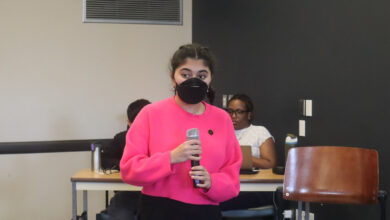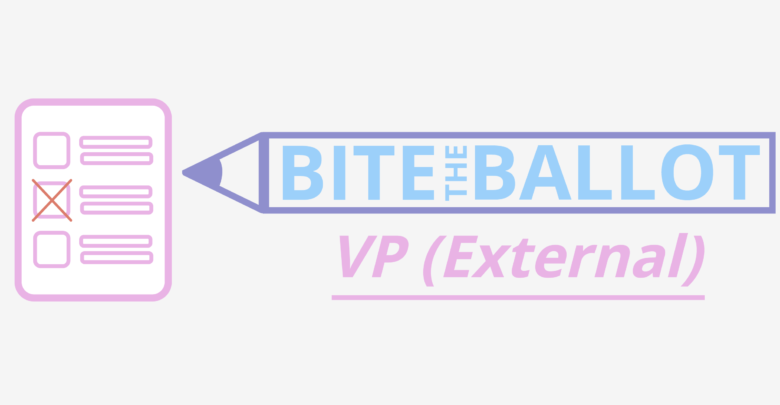 Lochlann Kerr
Lochlann KerrThe race for the vice-president (external) position has been a fierce and turbulent competition between incumbent Christian Fotang, a fourth-year biology major, and Chris Beasley, a fifth-year political science student. Both deliver similar platforms based on advocacy for students, but differ slightly on how they will achieve their goals. In the end, this will be a close race, but who deserves to, and will, win?
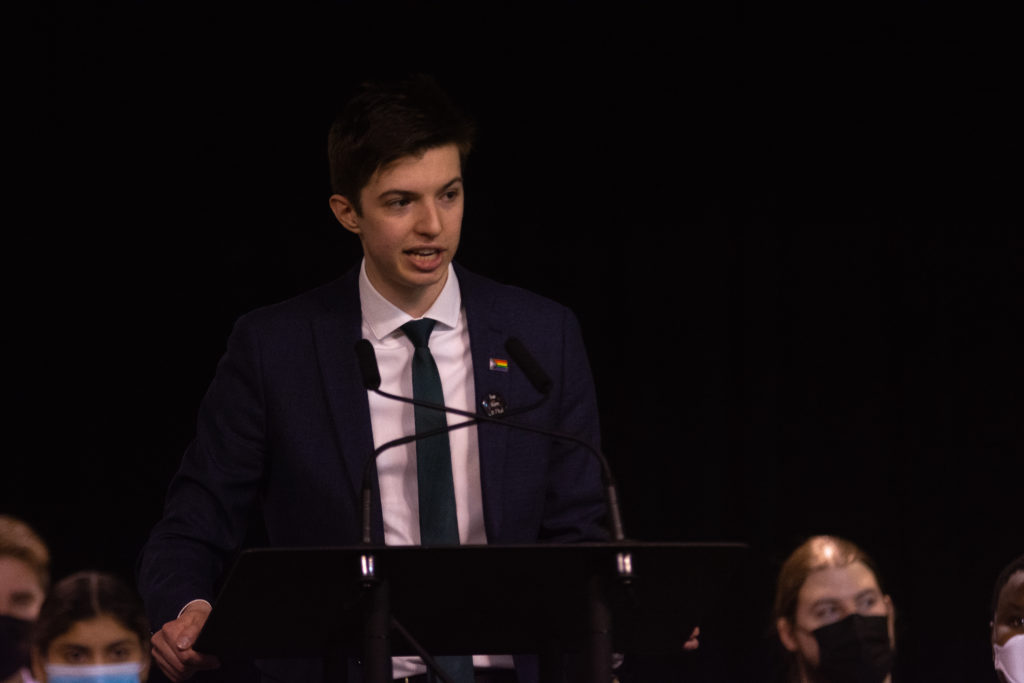
Chris Beasley
This year has been one of the hardest for students, with the COVID-19 pandemic, returning to campus, budget cuts, and tuition increases. Now more than ever, students need active action and advocacy, something that has been missing for the past year. The U of A’s protest game has been seriously lacking lately. Only one protest happened during the last vice-president (external) (VPX) term. Students want and need to be heard in order for things to change on campus. One of Beasley’s promises is planning more frequent and better protests.
Better and more organized protests are key in getting students on the forefront of the province’s mind, especially with the upcoming provincial election. Beasley promises to make student issues an election issue, which if achieved, can greatly improve life on campus.
Beasley is passionate about advocacy, and has big plans for supporting students on campus, particularly those who are often unheard. This year, many students have expressed concern about the rise in sexual violence on campus, and the lack of funding its resources have. Students are afraid, and the U of A campus is rapidly becoming unsafe for many students. Beasley, in turn, has promised to lobby and advocate for funding. Even though many of the candidates also promise this, Beasley’s approach is vastly different.
Instead of blanket funding spread across all of our campuses, Beasley hopes to advocate for tailored programs and resources. If you’re a student at Campus Saint-Jean, you’ll get help that’s made for French students. Beasley understands that not all problems are created equal, and many students face issues that differ from their peers. As well, Beasley noted that much of the allotted funding from the provincial government is going towards a survey conducted by the provincial government. This will gather information about sexual violence on campuses. Beasley acknowledged that sexual violence is a problem that students are aware of. In his platform, Beasley states that we don’t need more information, instead calling for “crisis funding for a crisis situation.”
It’s abundantly clear that Beasley cares about students, and he has a lot of ideas on how to do it. Beasley’s platform is thoughtful, but there’s only so much that protesting can do in the long-term. Beasley is absolutely capable, it’s just a matter of getting everything he hopes to achieve done.
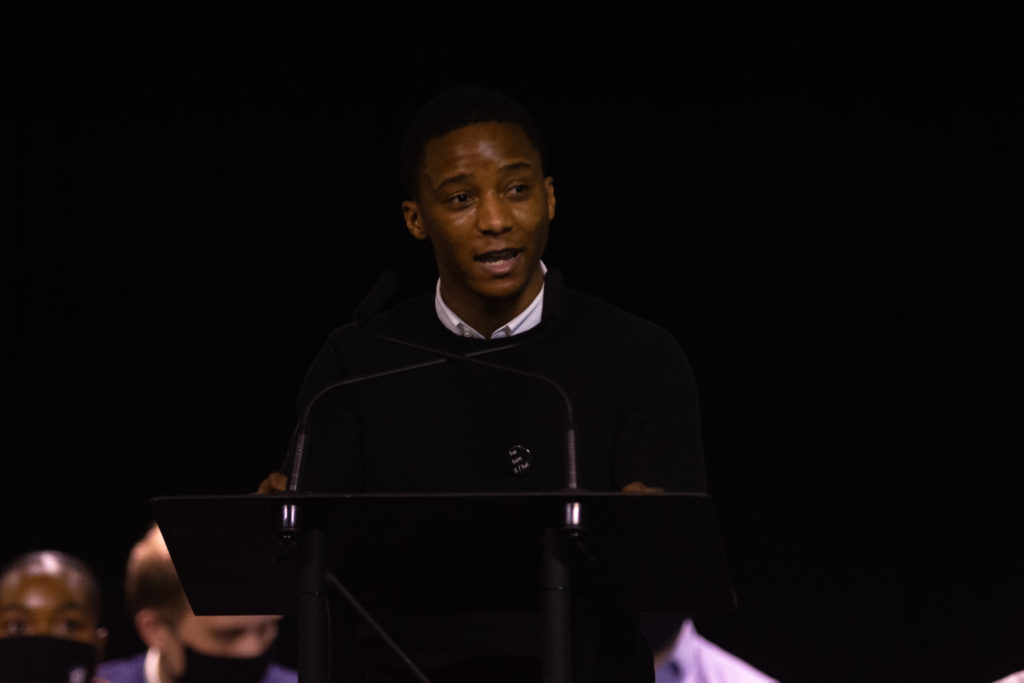
Christian Fotang
While Beasley’s means for advocating for student issues is through protesting, Fotang takes on a more collaborative approach.
For him, working alongside MPs, the provincial government, and different student groups is how he will achieve many of the points in his platform. Throughout his term, Fotang hasn’t been known for organizing protests; as mentioned earlier, the UASU only organized one protest during his term. Instead, Fotang has chosen to lobby stakeholders and collaborate with all levels of government. While lobbying often works, and it certainly has for Fotang, it can’t be the only solution.
Fotang has helped secure funding for his previous goals, but student issues keep worsening. Our tuition is rising, budget cuts are continuing, and campus is still unsafe for much of the student body. If advocating behind the scenes hasn’t worked in the past at eliminating these issues, why would it now?
Fotang needs to take an active role in fighting the issues that plague U of A students. While he does regularly meet with student groups, such as the International Students’ Association (ISA) and Association des Universitaires de la Faculté Saint-Jean (AUFSJ), Fotang needs to organize protests with them. While the issues we face on campus don’t affect us all in the same way, we still experience them. Issues that international, francophone, and Indigenous students face are still problems for the rest of the student body. We need to address them. In order to fight these issues, students on campus need to present a united front. The only way to achieve this is through protests.
Fotang, however, acknowledges that while protests are important, there is other work that needs to be done between periods of election or government action. Fotang has mentioned the use of direct action to make post-secondary education a provincial election issue. Fotang’s approach does have some merit but he should not downplay the impact direct demonstrations can have outside of election periods.
It’s no secret that our current provincial government doesn’t consider the needs of post-secondary students. U of A students are facing huge tuition increases and a real threat to the quality of our education. If Fotang wants to adequately advocate for the student body, he needs to stand up for us in a visible way.
In the past few years, the university administration and provincial government have widely ignored the student body. Advocacy starts with the group primarily impacted. Lobbying and working with the government and university is important. However, more focus needs to be placed on the students themselves.
One of the major themes in Fotang’s platform is how he wishes to continue the work he has already done. If some students feel as though things need to change, then continuing what you’ve already accomplished isn’t the solution. Those who do support Fotang, however, need to be able to recognize that there is room for improvement. Fotang needs to diversify his techniques, as well as who he represents. International and Indigenous students expressed during the forums that they worry about being left behind when elections are over. As much as Fotang has dedicated his time to helping these students, they still feel unheard and underrepresented.
No one can deny that Fotang deeply cares about the students he represents. His platform encompasses a lot, but that isn’t enough. His advocacy needs to extend to affected students.
Who will win, and who should win?
While Fotang has the experience to navigate advocating for students, Beasley has the passion that will really empower us. I predict Chris Beasley will win the vice-president (external) race because of his collaborative work with the different student-led organizations on campus, as well as his passionate public speaking throughout the forums.
Beasley should win because the student body needs an active advocate who will fight for them, instead of one who focuses on move collaborative forms of advocacy with the government and university administration.



